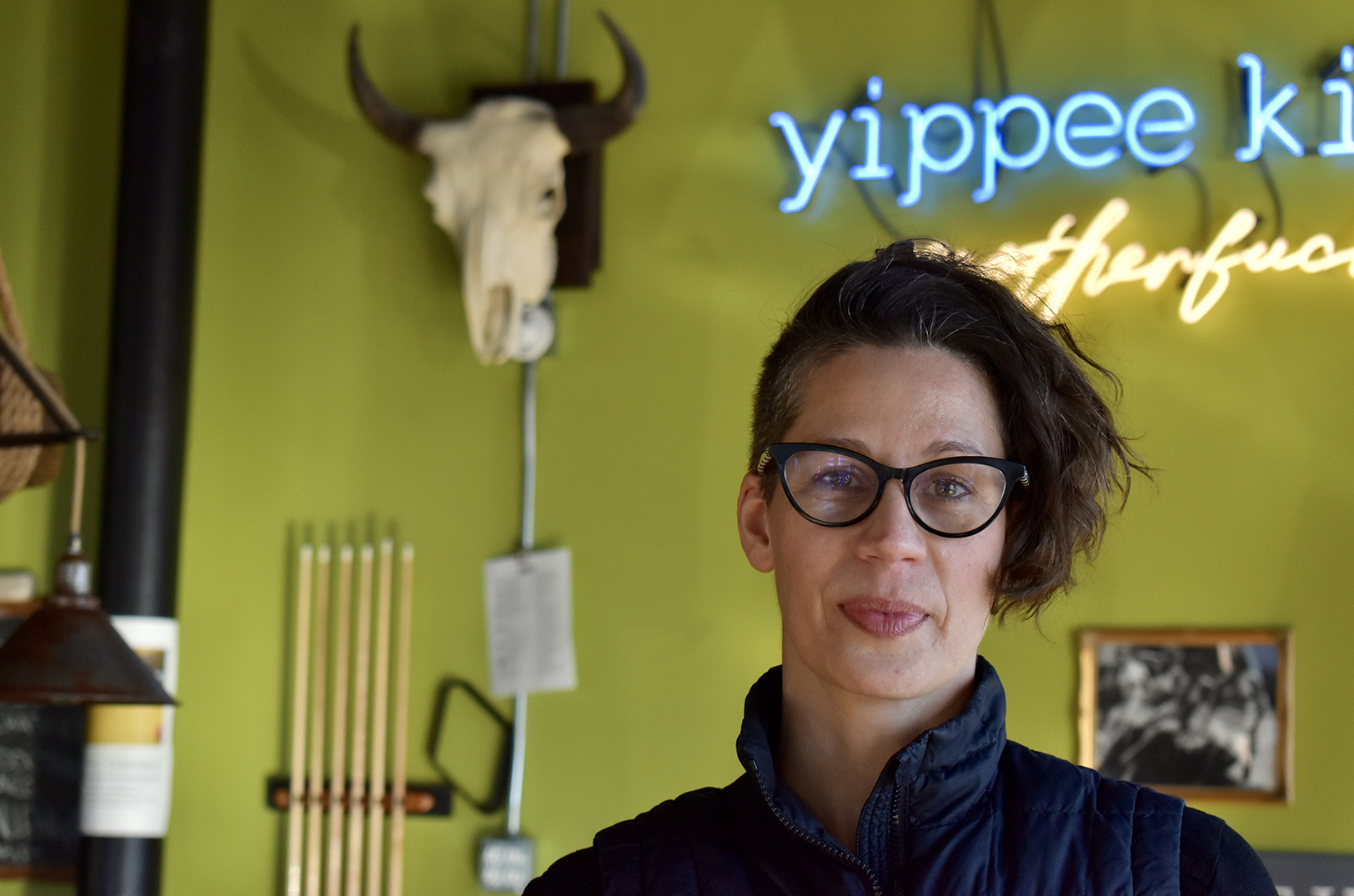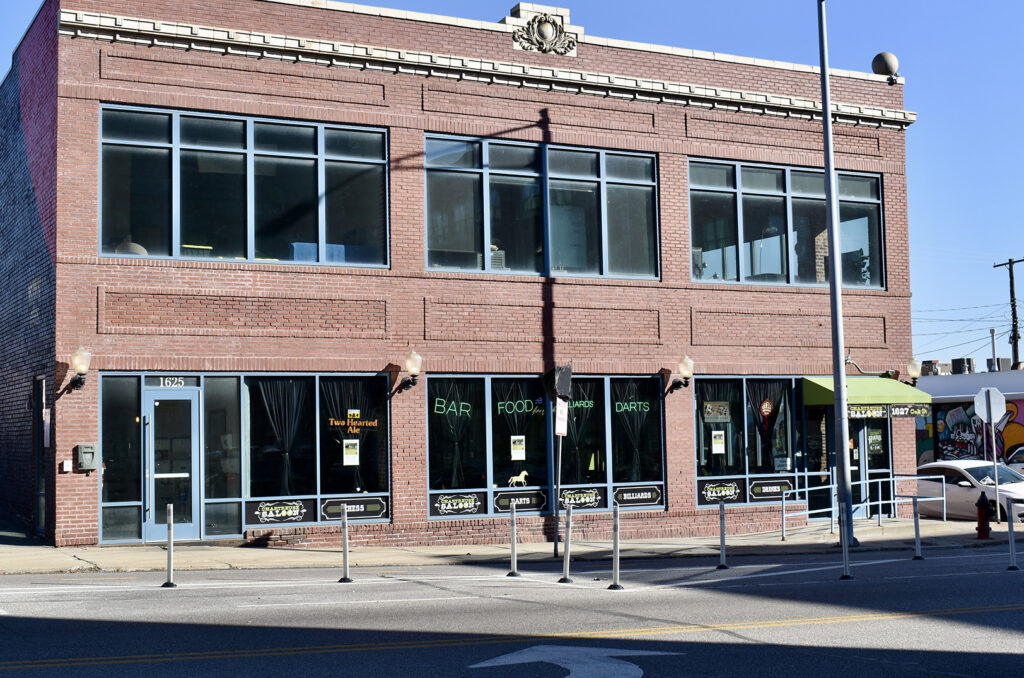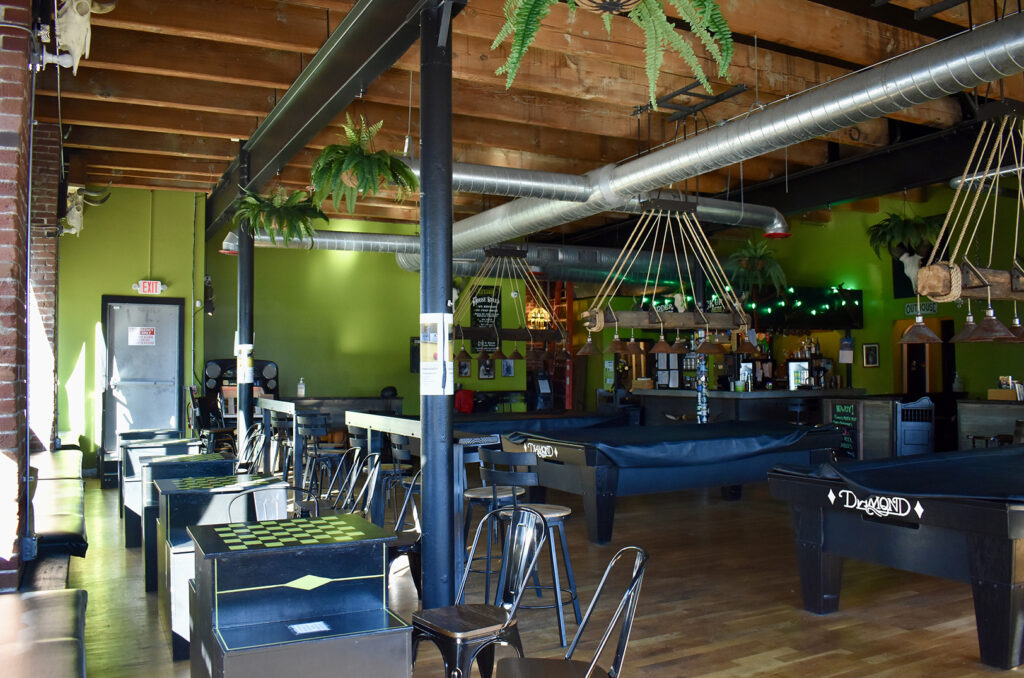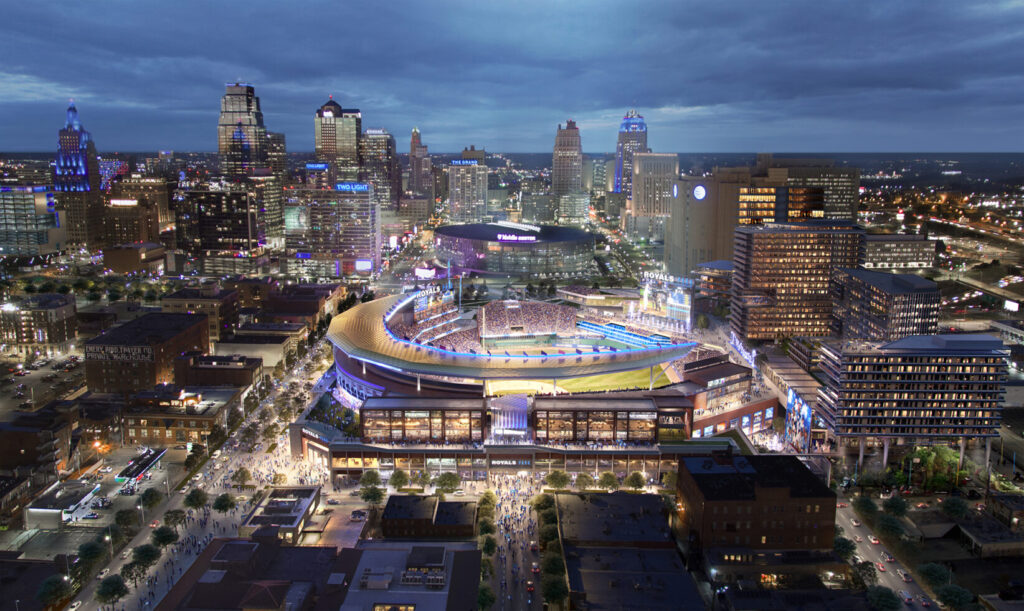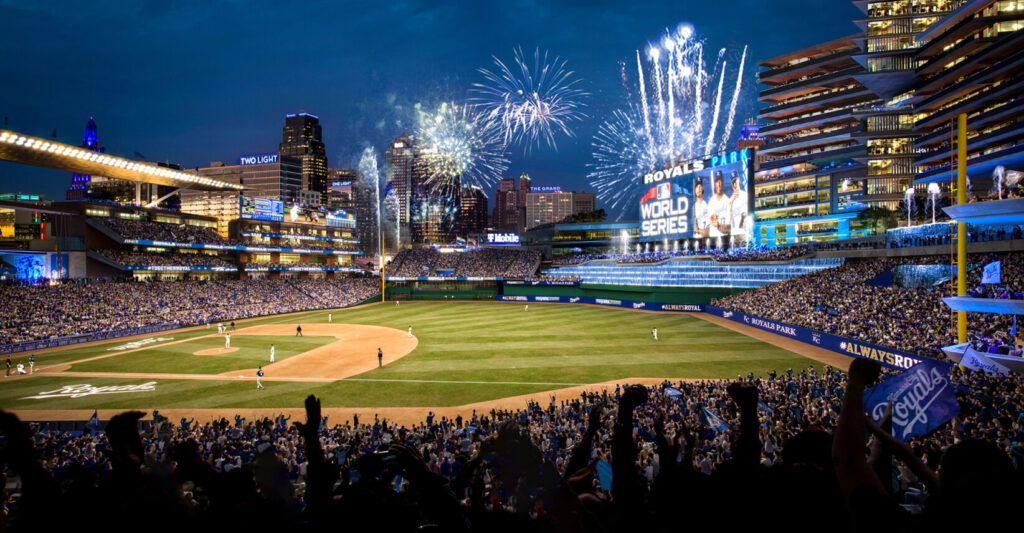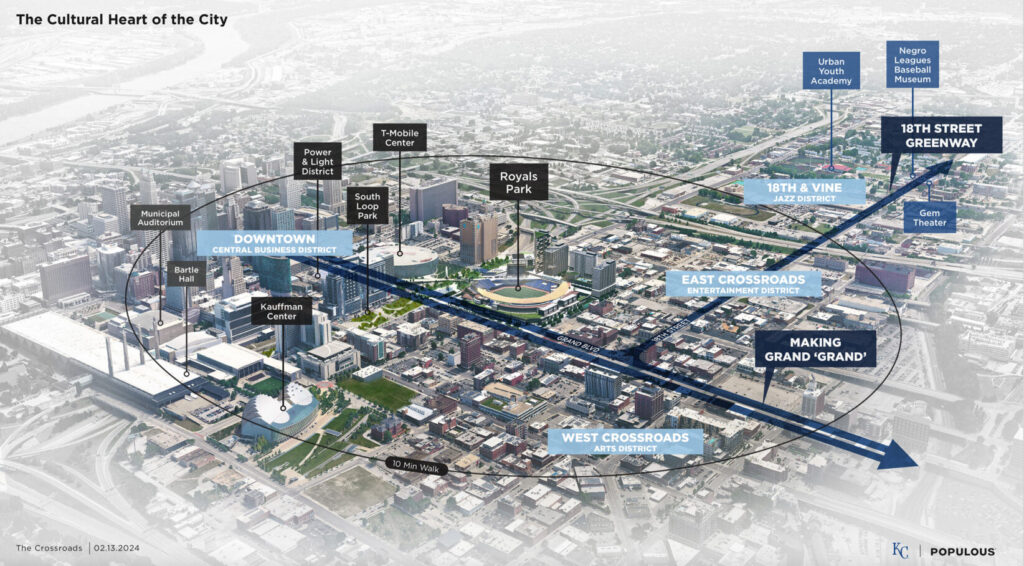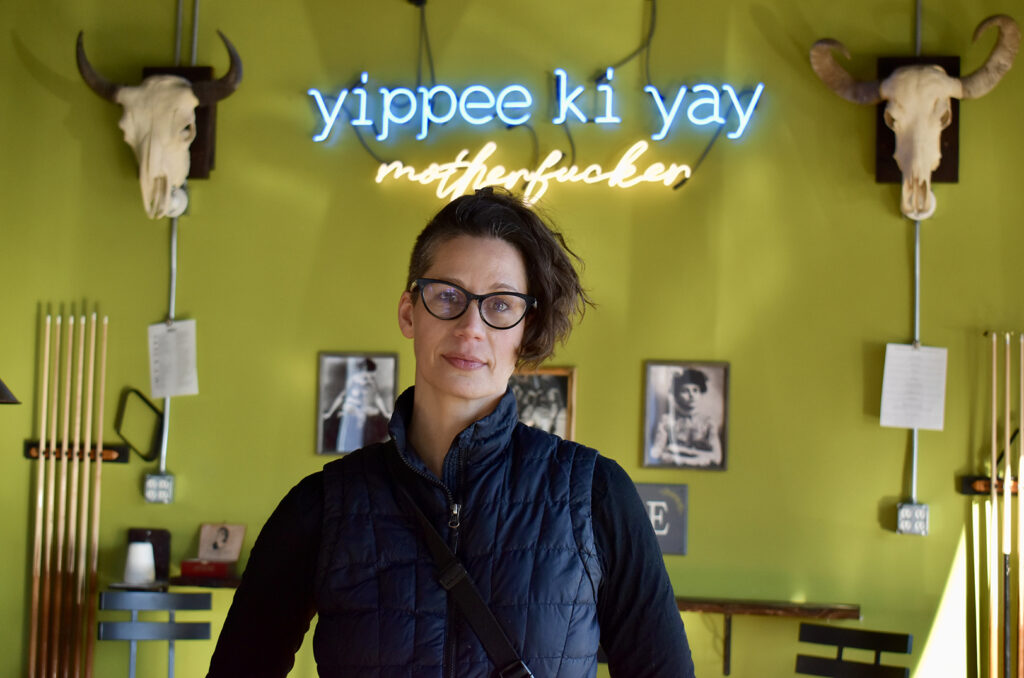Unlike many of her Crossroads neighbors — hoping to draw in crowds of football fans still riding high from Kansas City’s Super Bowl win — Jill Cockson’s business wasn’t open during Wednesday’s Chiefs victory parade.
Candidly, jersey-clad sports enthusiasts aren’t really within her typical customer profile, the James Beard-nominated owner of Chartreuse Saloon said, and she has no interest in catering her business to them.
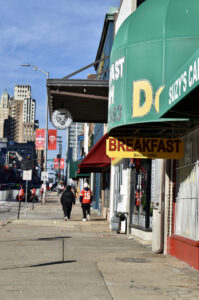
Small businesses along Grand Boulevard that would be demolished to make way for the Royals’ East Crossroads ballpark; photo by Austin Barnes, Startland News
“We fit into this neighborhood for a reason,” said Cockson, whose space at 16th and Oak streets offers an inclusivity-driven bar and billiard/game room. “We provide a safe haven from Westport, from Power & Light. People come to this neighborhood for a specific experience.”
That experience would be upended by a newly announced proposal to reshape the Crossroads into a mecca for Kansas City baseball fans, she said, and her business — faced with a literal wrecking ball — would be forced to relocate or close entirely.
Officials from the Kansas City Royals on Tuesday unveiled plans to develop a nearly 18-acre footprint in the East Crossroads, anchoring a $2 billion ballpark district from the former Kansas City Star building site at 1601 McGee St.
Stretching from Truman Road south to 17th Street and Grand Boulevard east to Locust Street, the development would encompass more than just the massive, long-vacant newspaper facility — ultimately requiring the departure of as many as two dozen businesses and organizations before construction fully gets under way.
The project aligns with the coming South Loop park effort that is expected to cap I-670 and physically reconnect the Crossroads neighborhood to downtown, specifically the Power & Light District — a point touted by the Royals and supporters of the site selection.
“If you peel back the layers of what’s really going on, it’s rich guys doing rich guy stuff,” Cockson said, offering sharp criticism of the plan and the Royals’ behind-the-scenes maneuvers so far — namely not opening a direct dialogue with tenant business owners who would be displaced, and instead targeting eager-to-sell landlords.
RELATED: Who wins and who loses with Royals ballpark plan
Among those impacted by demolition for the ballpark’s footprint: Cockson’s Chartreuse Saloon and such neighborhood staples as The Pairing wine bar and grocery, The Harlow urban wedding and event venue, and Kobi Q Korean BBQ, along with newcomer Green Dirt on Oak — a renovated three-level restaurant, bar and creamery set to open in March — and even the popular Church of the Resurrection, which is in the midst of its own expansion in the neighborhood.
Click here to read the Church of the Resurrection’s statement on the Royals’ site selection.
“This whole project is completely out of touch. We’re talking square peg, round hole,” said Cockson, who also developed Swordfish Tom’s in the Crossroads, as well as Drastic Measures, a two-time James Beard Award finalist in Shawnee, Anna’s Place in Omaha, and The Other Room in Lincoln, where she was a James Beard nominee for cocktails.
“The East Crossroads — and the Crossroads in general — has been built up and brought back by a lot of people who have been very passionate about maintaining a sense of authentic, unique, interesting, creative Kansas City businesses,” she said.
Many small business owners, including Cockson, were lured to the neighborhood by property owners for that reason, she said, noting they’ve developed concepts specifically to fit a Crossroads target market while remaining aligned with their own personal values.
“To put something like [the ballpark district] here would not only not benefit us because these businesses are not calibrated for that target clientele, but it would also deter our existing clientele from coming to the neighborhood,” Cockson said.
“Baseball people are not it for us.”
‘Crossroads is always changing’
A couple blocks away from the proposed ballpark site, entrepreneur Steve Revare is excited by the concept of an expanded downtown footprint bringing change to the Crossroads — even if the ripple effect from incorporating a baseball club and its fans into a neighborhood largely defined by the arts and its popular First Friday events is not yet fully known, he said.
“The complexion of the arts district will change a little bit, and we have to think long and hard about if that’ll be a positive or negative change to what’s existing here now,” said Revare, co-owner of Tom’s Town Distilling Co. “I mean, the empty Star building isn’t doing anything for the Crossroads now — so revamping it into something that could bring more people downtown would be great.”
The Royals’ site selection for its 34,000-plus seat stadium is a compelling move for the team and city, he added, emphasizing the opportunities it presents for the Crossroads and local business owners.
“It’s a positive development that we’re getting downtown baseball — a downtown stadium that will help the team, help Jackson County, help increase density downtown and in the Crossroads,” Revare said.
“The Crossroads is always changing,” he continued. “It’s changed a lot since we’ve been down here the past eight years. Development tends to make it too expensive for artists to stay, but it also leads to a different kind of vibrancy in the city. And that’s really valuable too.”
This is going to be awesome!!! Can’t wait! 💪🏽 https://t.co/7NYQrbASQt
— Patrick Mahomes II (@PatrickMahomes) February 13, 2024
Business owners are right to have questions, Revare acknowledged.
“A lot of our very good friends operate in the area, serving our products, and we’re going to need to see outreach from the Royals to make sure their concerns are being addressed,” he said.
“The city and the team are going to work to make this happen,” Revare continued. “We’re going to see people who are for it and people who are against it — but just like with anything else, big changes make everybody nervous. And when your business and your neighborhood are going to change so drastically, you’re having to extend a lot of trust.”
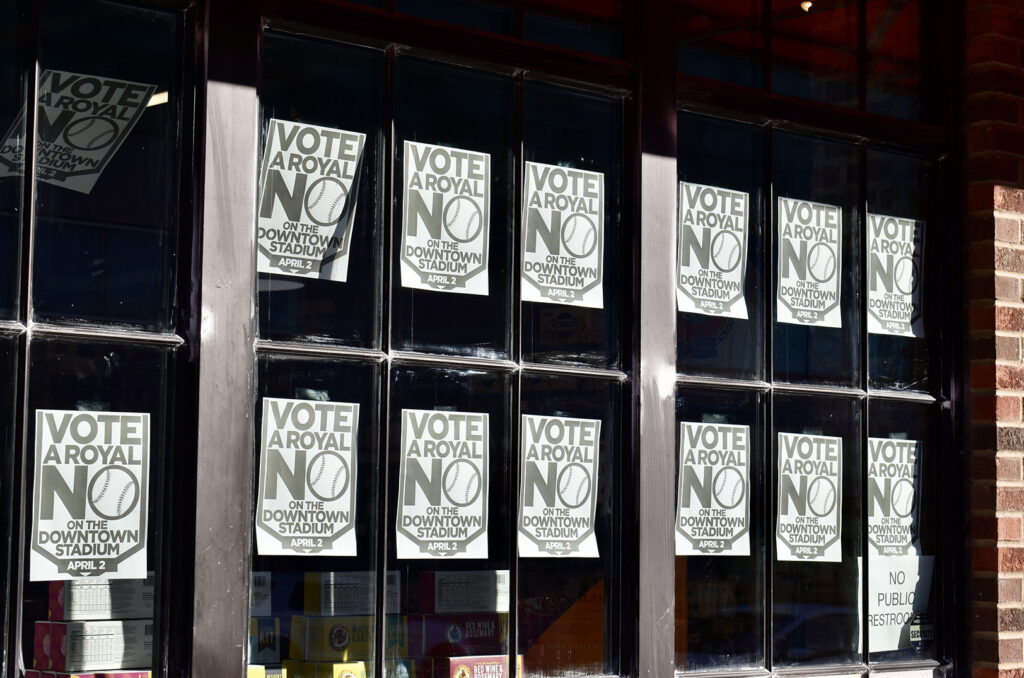
“Vote No” signs stuck in the windows on The Pairing in the East Crossroads; photo by Nikki Overfelt Chifalu, Startland News
Communication breakdown
For Cockson and other business owners, trust is already in short supply, she said, noting neighborhood advocates are mobilizing quickly for an aggressive campaign aimed at defeating an April 2 sales tax initiative that would provide critical funding for the Royals’ plan.
“That’s really the only strategy we have at the moment to get awareness out about what is really going on behind the scenes and how it will adversely impact the neighborhood,” Cockson said.
“My worry is that permanent damage has already been done, regardless of the outcome,” she continued. “You can’t build strong communities without transparency and trust transcending the ladder from the city, through developers, to landlords and tenants. If we had been properly communicated with from the beginning, we would be in an entirely different situation.”
At a recent Crossroads Community Association meeting — hosted at Cockson’s Chartreuse Saloon a week before the Royals’ public announcement — landlords who’d been part of ongoing conversations with the Royals about the development downplayed the project’s scope, Cockson said, including telling her the Chartreuse Saloon would be outside the footprint slated for demolition.
On Tuesday, she officially learned it was not.
“A lot of hardworking small business owners built this neighborhood back up with authenticity and we feel double-crossed. We were lured to the area only to be sold out with no defense,” Cockson said, noting honest dialogue with tenants would’ve helped soften the blow.
“But nothing, silence — just feigning ignorance when these conversations have been going on for months behind closed doors,” she said. “It’s really disappointing.”
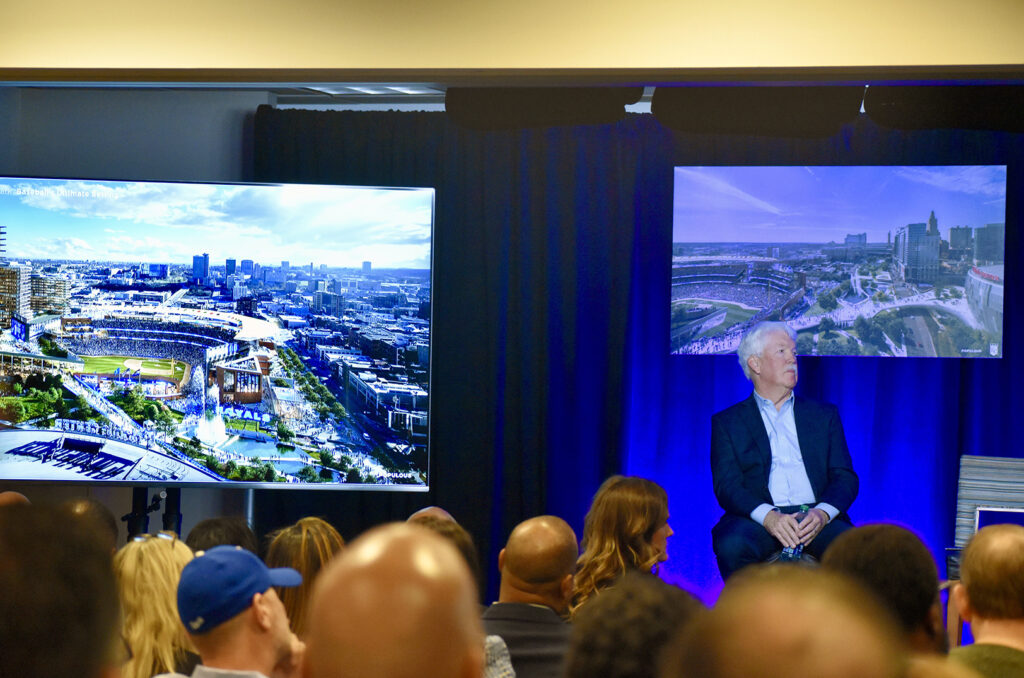
John Sherman, chairman and CEO of the Kansas City Royals, listens during a ballpark announcement event at Kauffman Stadium; photo by Taylor Wilmore, Startland News
At a press conference Tuesday at Kauffman Stadium, Royals officials spoke publicly about their plans for the East Crossroads site for the first time, and confirmed direct conversations with property owners had already begun.
“A guiding principle of ours is to go in, wherever we land — here in the Crossroads — and be a great part of that community, to blend in and enhance,” said Brooks Sherman, president of business operations for the Royals. “We want to start that with being good neighbors, and that begins with the land assemblage for this project.”
“We’re committed to and currently at work negotiating a fair and thoughtful lease agreement,” he continued. “It’s important to us that this is done with the community in mind, transparently. And that includes with property owners. … Those discussions with the property owners are under way, and we look forward to successful mutually beneficial results.”
Asked specifically by Startland News at the event about how the Royals planned to address the concerns of business owners in the footprint and the surrounding neighborhood, Sherman said the ball club was keeping tenants in mind.
“Each time we talk to property owners, we’re trying to understand what that business is and how they might see us helping that tenant in the process. So when I talk about working with property owners, I’m really looking all the way through to include the tenant,” he said. “We want to have conversations. We want to be helpful in this. We are not looking to come in and be the big brother or however you want to say it.”
The Royals would be open to helping businesses who are being displaced to find a new home, when necessary, Sherman said, although he did not offer details on what that could include.
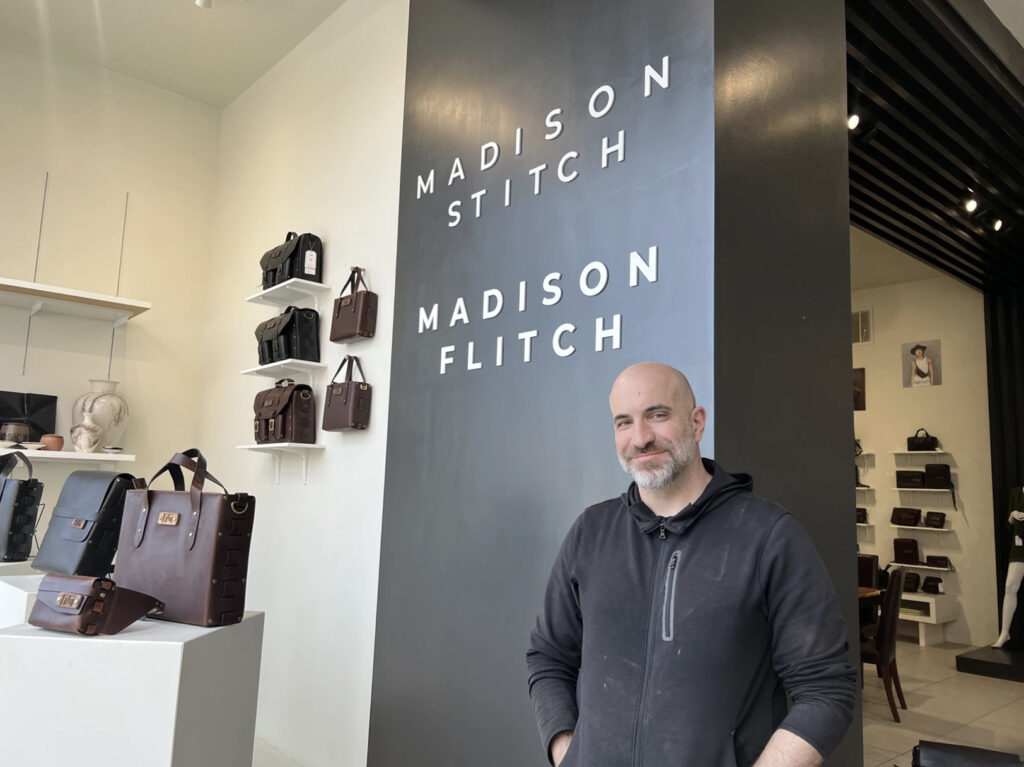
John Pryor owns his building at 16th Street and Locust Street. Under the Royals’ proposal, the business would border a hotel and corporate office. Pryor expects to be inundated with offers to sell his property but says his passion is worth too much; photo by Savannah Hawley-Bates, KCUR; RELATED: Crossroads businesses don’t want a Kansas City Royals stadium to bulldoze their neighbhorhood
John Pryor, owner of Madison Stitch, a farm-to-table leather goods shop on 16th Street, just outside the Royals footprint, is among those entrepreneurs who’d been waiting until Tuesday’s announcement to find out whether his business was on the chopping block.
He’s still left wondering what the future holds.
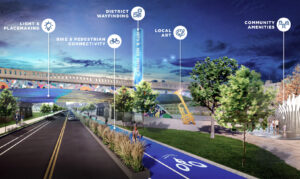
A presentation graphic from the Kansas City Royals details amenities near the proposed East Crossroads ballpark; image courtesy of Populous
“In the current renderings, their so-called ‘ballpark district’ is going to abut right up to my building, so it’s really unclear what the direct impact is going to be on me, my business, the building itself,” Pryor said. “We’ve not been contacted by the Royals; we have no idea what they might be thinking in regard to this area; they might not even care.”
“For us, it’s really a community neighborhood issue,” he continued. “I listened to the press conference and the only thing I heard them say about the [Crossroads Community Association] was that they are going to show local art. But there are bigger issues at play here in our community than just having our art on display.”
Business leaders and advocates are trying to get organized so they can better negotiate with the Royals, perhaps getting them to help contribute to local trash and security issues that will develop in the Crossroads if the project moves forward, Pryor said.
“But it all goes to the broader issue of ‘Do we want this to be a ballpark district? Or an arts district?’” he said. “Are the Royals going to be sensitive to the community’s needs and everything that has been built here to make it an attractive destination for them? Right now, based on what we’ve seen, they’re not.”
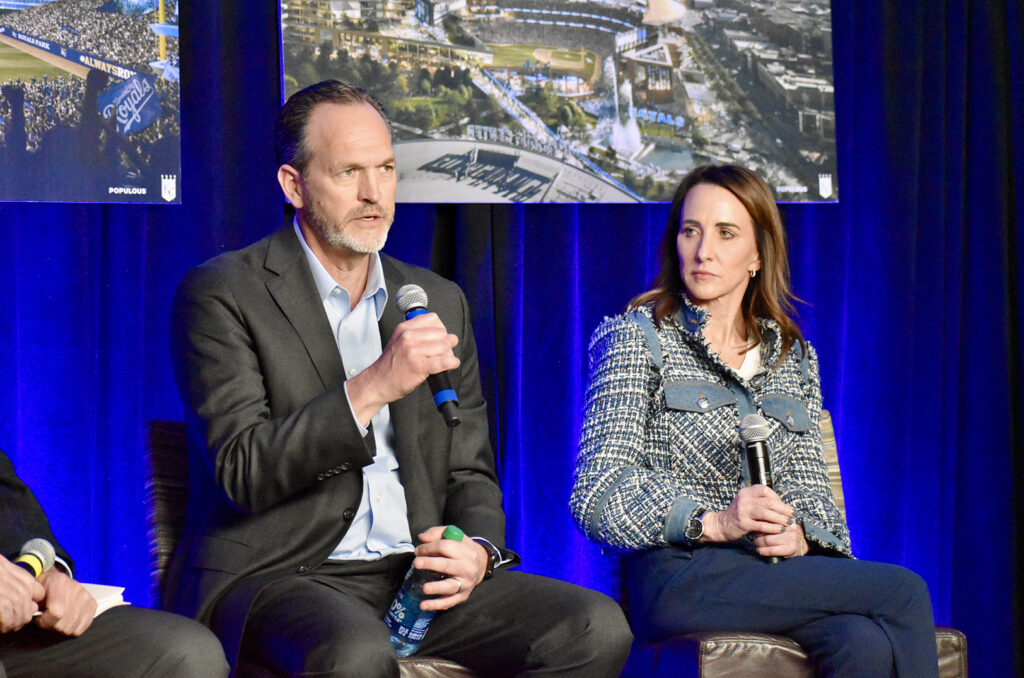
Brooks Sherman, team president for the Royals, speaks alongside Sarah Tourville, executive vice president, chief commercial and community impact officer for the Royals, during a press conference at Kauffman Stadium announcing the location for the Royals proposed East Crossroads ballpark; photo by Taylor Wilmore, Startland News
365-day-a-year impact
The Royals envision “much more than a ballpark,” explained Sarah Tourville during Tuesday’s press conference.
“This is an investment in our community, an investment that will provide economic growth 365 days a year,” said Tourville, executive vice president, chief commercial and community impact officer for the Royals.
While the ball club is in the process of finalizing a full community benefits agreement, it has centered its goals around core commitments, she continued.
“We will deliver a world-class neighborhood ballpark district and experience that is accessible and welcoming to all. This means a district that integrates with and elevates Kansas City’s urban fabric, incorporating local art and artists will be a priority,” Tourville said. “The district will spur inclusive growth and job creation, uplift the community and foster a more equitable and prosperous Kansas City.”
“That commitment includes hiring and working with minority women and veteran owned businesses and providing those businesses with support,” she added, noting plans for a union labor agreement, prevailing wage agreement for workers, and workforce training. “We provide development programs, wraparound services and foster community engagement and outreach with real and measurable results.”
To make that happen via the Crossroads-anchored ballpark, conversations with about 20 property owners are at play with the Royals talking to each one directly and individually, Sherman said.
“We expect to move to acquire those properties in very short order,” he said Tuesday.
The Royals will be the purchaser of the properties, Sherman noted.
“It will be part of our private investment in the public private partnership,” he explained of the ballpark setup that ultimately sees Jackson County as the final owner. “We would buy the land and then contribute it to the county as the owner of the stadium.”
But first, the Royals must negotiate a “mutually agreeable situation” with each property owner, Tourville said.
“We’re committed to having those conversations ongoing,” she said. “These are much greater than business transactions, these are about fostering relationships and making very personal outreach to those individual businesses.”
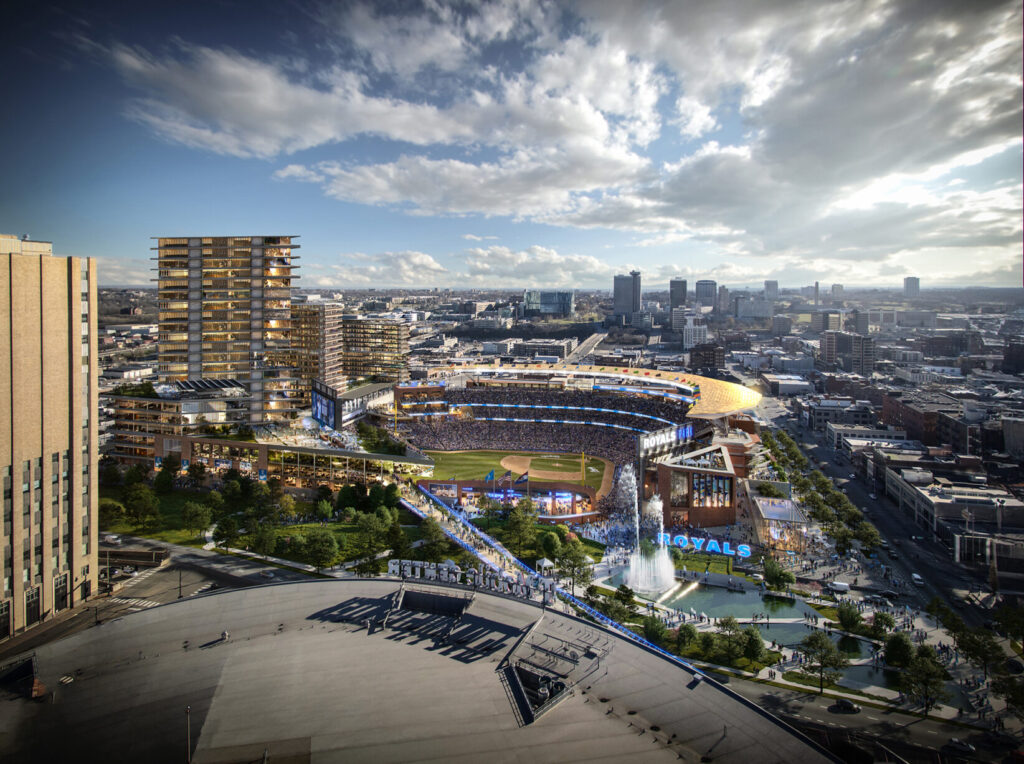
Rendering of the Royals’ proposed ballpark district in the East Crossroads, looking south into the Crossroads Arts District; rendering courtesy of Populous
Businesses still in the deal’s shadow
Calling out the Royals’ comments about transparency, Cockson said tenant business owners’ questions have gone unanswered for months despite apparent communications with landlords.
The East Crossroads site was in early consideration for the ballpark district, but quickly was eliminated in favor of locations in Kansas City’s East Village and North Kansas City. Those finalists remained the lone contenders until late summer 2023 when the Crossroads plan unexpectedly returned to the table as a viable option for the Royals.
“Every time we tried to reach out to somebody — we’ve been trying now for months to reach out to everybody from the city, the county, the Royals, city council, the city manager — it’s just been a giant hot potato that everybody just says, ‘Oh, you need to talk to somebody else.’ No information,” Cockson said. “Everybody plays stupid.”
Outreach about the site selection from Startland News sent this week to Mayor Quinton Lucas’ office, Councilman Eric Bunch, whose district includes the East Crossroads, and the Greater Kansas City Chamber of Commerce, among others, went unanswered.
Lots of reactions to the Royals ballpark site announcement — I’m still processing my own, TBH. You all feel free to keep sharing your thoughts and concerns on here. It’s totally understandable to @ me as we work it out together. I may share some thoughts on here soon.
— Eric Bunch (@EricWBunch) February 14, 2024
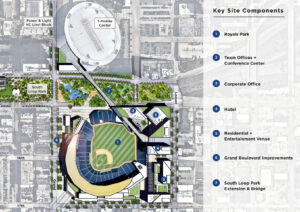
Royals East Crossroads ballpark site map, showing the ballpark district connected to Power & Light; Image courtesy of Populous
Even after Tuesday’s announcement, Pryor is still left wondering how the East Crossroads became the winning site, he said.
“I’m very curious why the Royals find this to be an attractive location as opposed to the East Village, which would be a cheaper development project for them,” the Madison Stitch founder said. “It’s not clear to me how this is going to drive more money to the Royals and how it would necessarily benefit them. I also feel like this is gonna be a bit of a political disaster for them if they’re not gonna be sensitive to the neighborhood needs — and it would reinforce this idea that the Royals aren’t the most competent organization.”
The Crossroads site makes the most sense for ease of access, said Earl Santee, senior principal, global chair and founder of Populous, the Kansas City firm designing the stadium. The KC Streetcar line runs just blocks to the west, a transit center is a 10-minute walk, and the ballpark’s plans require no major transportation improvements, he said.
During a presentation Tuesday, Santee also noted the Crossroads option would eliminate the need for additional parking construction, citing 40,000 available spaces downtown with a gameday need of only 9,000 spaces within a 10-minute walk.
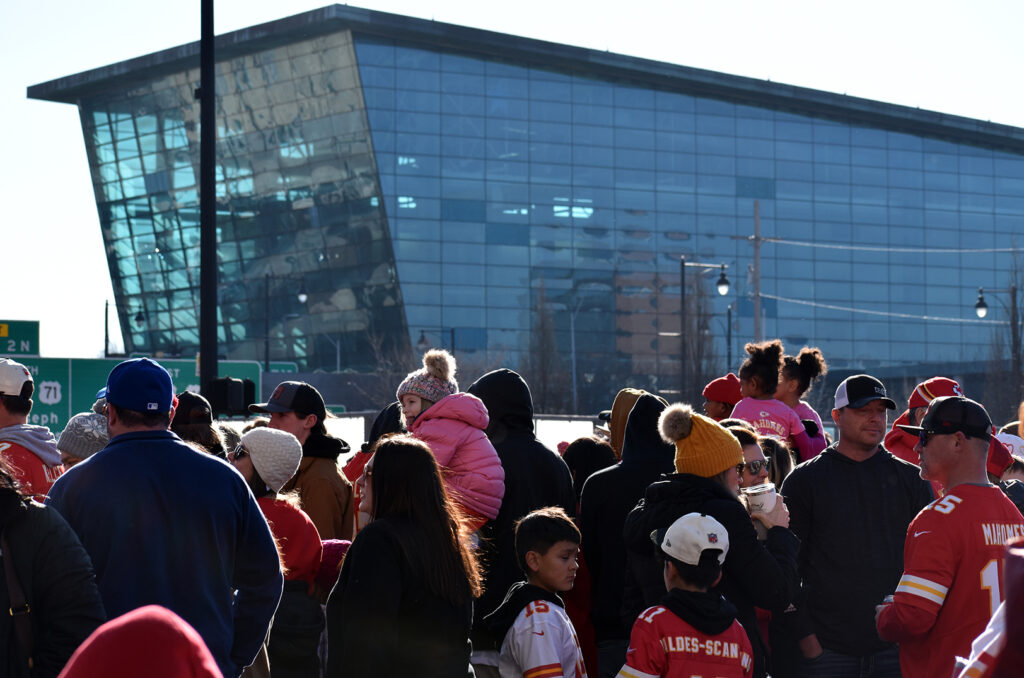
The former Kansas City Star building looms behind Chiefs victory parade-goers in the Power & Light District; photo by Austin Barnes, Startland News
Cockson and Pryor theorized that the synergy with nearby Power & Light and the assorted business interests owned by The Cordish Companies also were major contributors in the decision. It’s an idea validated by Royals officials at Tuesday’s press conference, as well as the ball club’s plan to construct a bridge across I-670 — through the proposed South Loop park project — connecting the ballpark to the T-Mobile Center.
ICYMI: Royals revisit downtown stadium site hyped by Power & Light District developer
“Eight blocks away, there are eight square blocks in the East Village that are completely vacant and were purchased for this purpose,” Cockson said of the alternate finalist location long-preferred by the City of Kansas City, Missouri. “But if you follow the money, look at who’s involved, it’s not rocket science how this happened.”
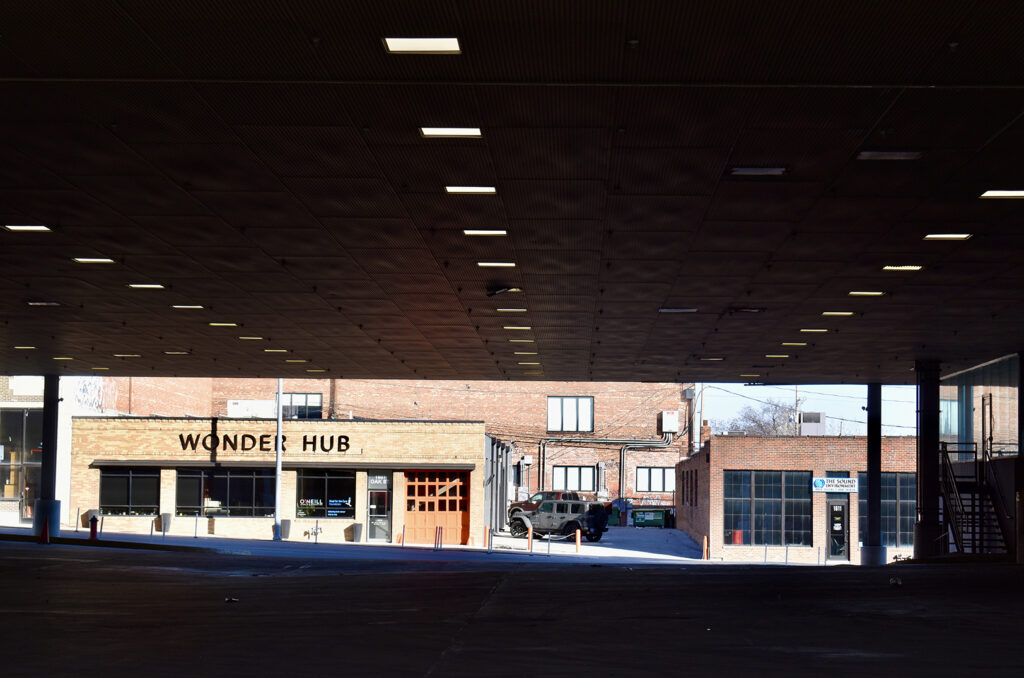
Oak Street businesses seen through the loading and unloading zone of the former Kansas City Star building; photo by Nikki Overfelt Chifalu, Startland News
‘Locals lose — rinse, repeat’
Crossroads business owners’ concerns must look like extremely tertiary issues compared to the big money and interests at play, said Pryor.
“I know we’re not the power players here,” he said. “But there are businesses in the footprint who have not been contacted [by the Royals]. This first official statement is where they learned that ‘Well, I guess my business won’t exist here in five years.’ And that’s a big part of why this feels like a very disrespectful process.”
Late efforts to convince people like Cockson that the incoming ballpark will be good for her Crossroads business — despite the coming upheaval and an ongoing chasm between arts and sports audiences — also feel beyond condescending, she said.
“It’s an insult to my intelligence and my experience,” said Cockson. “When you develop hospitality spaces, you have to understand what drives the consumer psychology of your target demographic. You have to connect with them on an emotional level. And for billionaires to mansplain to me how a completely different demographic will be good for me is so out of touch and so insulting and so dismissive of 26 years of hospitality experience.”
“I’ve developed five independently sustainable, successful businesses in an industry that is known for having an 85-percent failure rate,” she said. “I’ve got two James Beard-nominated concepts under my belt. I know what I’m doing and I know what I’m talking about.”
Even if the audience wasn’t mismatched to the Crossroads, Cockson said, Royals fans have vocalized — and proven through behavior — their preference for tailgating culture over spending money in the area around the ballpark.
“If this baseball crowd is such a lucrative crowd — ‘Man, there’s so much money to be made on them’ — please tell me why the current stadium is not surrounded by successful, thriving businesses,” she said. “Instead, it’s surrounded by a broke-down parking lot and an abandoned hotel. And the reason is because the demographic that is the baseball crowd hangs out in the parking lot and consumes cheap beer and booze and snacks that they brought from home and didn’t spend a dime to purchase anywhere within the neighborhood, then goes and attends the baseball game. There is no money to be made on them outside of the baseball stadium itself.”
“If you are trying to convince me that suddenly they are going to hang up those shoes, switch M.O.s, and suddenly be interested in spending tons of money at local craft breweries, local craft cocktail bars, buying locally-made goods at an elevated price point, at a James Beard Award-winning restaurant, you are out of your mind,” Cockson added. “It’s simply false. It’s a lie.”
She worries the economic climate around a Crossroads-centered ballpark would only support generic chain and franchise restaurants, pushing out all the creative entrepreneurs who currently help to define the neighborhood.
“Everyone better wake up because if this becomes real, it’ll be ‘OK. Well, good luck with your Applebee’s, Starbucks, and rent no one can afford,’” she said. “All the money goes to the billionaires; the locals lose — rinse, repeat.”
Recognizing the city’s recent momentum, Cockson said the key to continuing to attract new visitors and interest lies in maintaining a sense of identity — a sense of self derived from the flair created by local businesses like hers.
“Kansas City is really conflicted right now,” she said. “You want to grow up and be a real boy? Don’t be so quick to sell out and strip away everything that’s unique. No one flies to Chicago to eat at Applebee’s.”
Startland News reporter Nikki Overfelt Chifalu contributed to this report.




